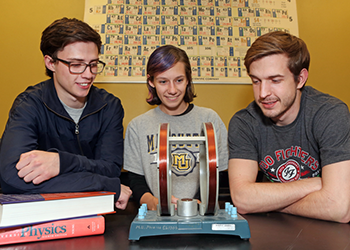Physics Minor
The physics minor helps student achieve a grasp and understanding of fundamental physics principles beyond the introductory level.
Physics minor requirements and curriculum
- The physics minor requires 20 hours of physics including one of the introductory sequences (1013-1014, 1003-1004, or 1001-1002).
- Physics Minor Curriculum
Astronomy Minor
The Astronomy minor is intended for students who are interested in learning about modern astronomy and astrophysics.
Astronomy minor requirements for non-physics majors
- One of the introductory physics sequences (PHYS 1013/1014; or PHYS 1003/1004; or PHYS 1001/1002)
- PHYS 1008 (Astronomy and Space Physics)
- PHYS 2400 (The Microscopic World)
- PHYS 3021 (Introduction to Theoretical Astrophysics)
- PHYS 3022 (Introduction to Observational Astronomy)
The Astronomy minor for non-physics majors requires a total of 20 credit hours.
Astronomy minor requirements for physics majors
- PHYS 1008 (Astronomy and Space Physics)
- PHYS 3021 (Introduction to Theoretical Astrophysics)
- PHYS 3022 (Introduction to Observational Astronomy)
- PHYS 4931 (Topics of Special Interest in Contemporary Physics) with the PHYS 4931 course taken under the guidance of one of our astronomy/astrophysicist faculty and the topic being in the realm of astronomy or astrophysics. Note that this PHYS 4931 course is then used for the Astronomy minor requirement and may not then be used for a Physics major elective course requirement.
The Astronomy minor for a physics major requires a total of 12 credit hours beyond the physics major requirements.
Biophysics Minor
Students who complete the Biophysics minor achieve a grasp of physics as it relates to solving biological problems and to a general understanding of the nature of biological problems and of proteins and cell membranes in particular, and of several techniques based on physics principles that are used in biological investigations. Graduates may apply the quantitative skills learned in this minor to graduate or medical school studies, or to other applied vocations.
Requirements for the Biophysics minor
- One year each of introductory biology, chemistry, and physics
- Introduction to organic chemistry (CHEM 2111/2112 or 2113/2114, or BISC 2050)
- Differential and integral calculus (MATH 1410 or MATH 1450/1451)
- *PHYS 4046/5046, or equivalents by consent of Physics Department offered fall, odd years
- *PHYS 4065/5065 offered spring, even years
- PHYS 3953 offered every term, meets Fridays 9:30 to 11:00 at the Medical College
- PHYS 3995 offered every term; contact Physics Department for consent form.
- PHYS 3995 must be taken for 3 credits
- Biophysics Minor Curriculum
* (May carry graduate credit)
Biophysics faculty, with whom to participate in research
Marquette University
-
Dr. Edwin Antony, Assistant Professor of Biological Sciences
-
Dr. Brian Bennett, Professor of Physics
-
Dr. James Buchanan, Professor of Biological Sciences
-
Dr. Anne Clough, Professor and Chair of Mathematics, Statistics, and Computer Science
-
Dr. Joseph Collins, Associate Professor of Physics
-
Dr. Robert Fitts, Professor of Biological Sciences
-
Dr. John Karkheck, Professor of Physics and Director of Physics for Medicine
-
Dr. Michelle Mynlieff, Professor of Biological Sciences
-
Dr. Daniel Rowe, Professor of Computational Sciences
-
Dr. Martin St. Maurice, Assistant Professor of Biological Sciences
-
Dr. Pinfen Yang, Professor of Biological Sciences
Medical College of Wisconsin
-
Dr. William Antholine, Associate Professor of Biophysics
-
Dr. Jimmy Feix, Professor of Biophysics
-
Dr. Neil Hogg, Professor of Biophysics
-
Dr. James Hyde, Professor of Biophysics
-
Dr. Andrzej Jesmanowicz, Associate Professor of Biophysics
-
Dr. Balaraman Kalyanaraman, Professor and Chair of Biophysics
-
Dr. Candice Klug, Professor of Biophysics
-
Dr. Shi-Jiang Li, Professor of Biophysics
-
Dr. Kathleen M. Donahue Schmainda, Departments of Radiology and Biophysics
-
Dr. W. Karol Subczynski, Associate Professor of Biophysics
-
Dr. Jeannette Vasquez Vivar, Professor of Biophysics
National Institutes of Health
-
Dr. Peter Bandettini, Director, Functional MRI Facility and Chief: Unit on Functional Imaging Methods, Laboratory of Brain and Cognition
Who to contact for more information


